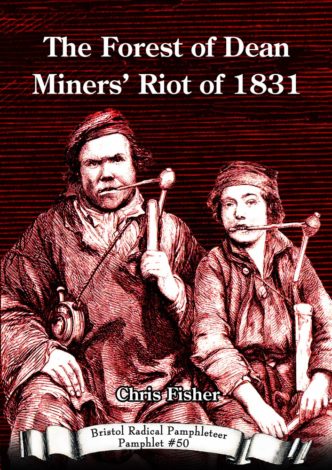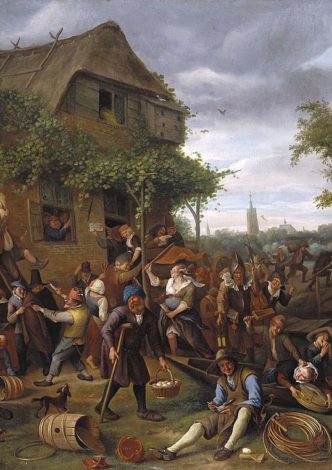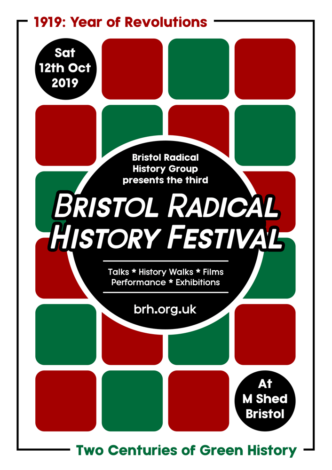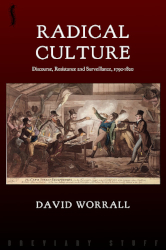The Forest of Dean uprising of 1831 received scant attention from historians before 1975 when Chris Fisher started researching the subject as part of his MA in history studies at the University of Warwick. His MA dissertation was the first thorough study of the riot and is up to now unpublished. BRHG decided to publish it in its original form as we believe that it provides an alternative and critical insight into the events surrounding 1831. Fisher argues that the Forest of Dean Riot of […]
The phrase “the moral economy” was first used by E. P. Thompson, within the essay of the same name. He explained it as was part of a long change in economic and community relations. As Britain industrialised at speed, there was a change from a paternalistic rural economy, to a free market guided by the ideology of Adam Smith. The moral economy related to part of the resistance from the labouring poor during these economic and social upheavals. This was community based, with a crowd of people […]
 Not A BRHG Event
Not A BRHG Event
David Bollier will give an overview of the latest thinking on the commons, based on his new book Free, Fair, and Alive: The Insurgent Power of the Commons, which presents a foundational re-thinking of the commons – the self-organized social system that humans have used for millennia to meet their needs. It offers a compelling vision of a future beyond the dead-end binary of capitalism versus socialism that has almost brought the world to its knees. The talk will be followed by a Q&A and […]
A storytelling that demonstrates, however benign the technology, it is who owns and controls it that matters. A narrative that recounts the conflict between the rich landowners who want to tame and exploit a marginal place and those whose subsistence is rooted in this rich wilderness. This tale of Whittlesea Mere in the Fenland starts in 1605 and ends in a few years into the future ...when the environment strikes back. Story lasts approximately 40 minutes.
Connecting the Norman Conquest and Peasants’ Revolt with fracking, our housing crisis and Brexit via the Enclosures and Industrial Revolution, the show draws a compelling narrative through the people’s history of England. Part TED talk, part folk club sing-a-long, come and share these tales as they have been shared for generations. We expect this event to be very popular! Advance tickets are available here.
 Not A BRHG Event
Not A BRHG Event
Stephen Hunt will discuss the ecology movement’s deep roots in the Romantic era at the Dorset Radical Bookfair at the Corn Exchange, Municipal Buildings, High St East, Dorchester, Dorset, DT1 1HF. Industrial capitalism emerged together with the mass exploitation of fossil fuels during the Eighteenth Century. Over the next century it became increasingly apparent that accelerating processes of expansion and extraction threatened many habitats, or even the whole planet. Green Romantic […]
The eighteenth and nineteenth centuries witnessed widespread attempts to ‘privatise’ rural England. By enclosing common land and extinguishing customary rights, rural elites sought to physically reshape and culturally redefine the countryside. In counties such as Somerset and Dorset, labourers increasingly found themselves barred from entering the fields and woodland that had supported their families for generations. Meanwhile, those who attempted to voice their concerns regarding these changes […]
Stephen Hunt of the Bristol Radical History Group will start the day with an overview of the ecology movement’s roots in the Romantic era. Industrial capitalism emerged together with the mass exploitation of fossil fuels during the Eighteenth Century. Over the next century it became increasingly apparent that accelerating processes of expansion and extraction threatened many habitats, or even the whole planet. Green Romantic anti-capitalism was an outcome of such processes. The negative social […]
In 1973 Kath Holden helped found a small commune based on a 135-acre dairy farm in West Wales. She went on to become a smallholder in the same area and disputed her entitlement to common grazing with local farmers, recalling earlier struggles for common-land rights. Later in the decade she volunteered on a farm in the USA, which offered sanctuary for people with mental health difficulties recovering from being in hospital. Inspired by these experiences, she went on to work on one of the earliest […]
Worral's book concentrates on the period of the French revolution and the Napoleonic wars. The narrative is based mainly in London, and looks at those who wanted to replicate the French Revolution in Britain. The main thread looks at those who believed in the work of Thomas Spence, who has largely been ignored in the mainstream history books. Spence was an ultra-radical, who saw the main problems with British society in land ownership. He wanted common land ownership, on a corporate basis, but […]




